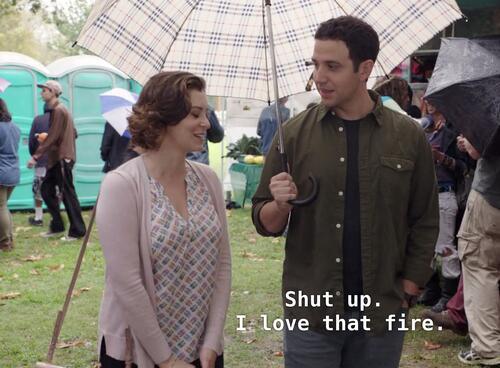Getting "Crazy" About History
Crazy Ex-Girlfriend’s Rebecca Bunch (Rachel Bloom) has many areas of expertise: real estate law, baking pretzels, and bewitching every man she comes into contact with, just to name a few. The show’s leading lady is also apparently a student of history... and I don’t just mean her relationship history. As the series wraps up, let’s examine a few historical moments from each season of Crazy Ex-Girlfriend.
Triangle Shirtwaist Fire
In season 1, episode 4, Rebecca goes on a date with one of her on/off love interests, Greg Serrano (Santino Fontana). While together, they discover that they share a “favorite fire.” Rebecca starts, “Once a week, I google trivia about the Triangle Shirtwaist Factory Fire,” to which Greg exclaims: “Shut up! I love that fire! That’s like my favorite fire.” Rebecca responds: “No, stop messing with me. I know it’s weird,” to which Greg insists: “Why is it weird to be obsessed with the flashpoint that single-handedly ignited labor reform in the U.S.?!”
On March 25, 1911, 500 workers were making blouses in New York City’s 10-story Triangle Shirtwaist Factory building when a fire started. In just 40 minutes, 146 workers—mostly Jewish and Italian immigrant women between ages 16 and 23—burned or jumped to their deaths. Activists argued that the factory owner should have heeded their warnings about unsafe working conditions during the Uprising of 20,000 in 1909, led by activists like Clara Lemlich Shavelson. She famously stated, “I offer that a general strike be declared now.” After the fire, Rose Schneiderman encouraged further strikes and action, stating, “This is not the first time girls have been burned alive in the city.” Schneiderman and Lemlich’s activism and organizing found more success following the tragic Triangle Shirtwaist Fire, which was indeed an important catalyst for the American labor movement, as Rebecca Bunch and Greg Serrano note.
Holocaust Memory
In the second season, Rebecca takes her then-boyfriend Josh Chan (Vincent Rodriguez III) home to New York for a cousin’s bar mitzvah. Viewers may have expected to experience New York Jewish culture through the eyes of Josh, the Filipino Catholic. But instead, Rebecca is the one who appears uncomfortable with what she perceives as an emphasis on suffering in Jewish rituals. Attendees of the bar mitzvah circle around to dance the horah, while Rebecca’s mother Naomi (Tovah Feldshuh) sings the song “Remember That We Suffered.” Naomi sings: “I don’t want to bring up the Holocaust. I know, I know! The Holocaust!. But the Holocaust was a really big deal. Remember that we suffered.” Naomi then reemphasizes, “Have we mentioned Hitler? I’m just saying that we suffered.”
The song draws on not only Holocaust history, but also on the memory of the Holocaust and the generational trauma that still impacts Jewish communities today.
“Where’s Rebecca Bunch”
The season 2 finale ends with Josh bailing on his wedding to Rebecca. Then, the opening song of season 3, “Where’s Rebecca Bunch,” takes place in an eighteenth-century village and draws inspiration from the opening scene in Beauty and the Beast, portraying the gossipy nature of a small town. Thus, in old British accents, cast members sing “A scandal has rocked our village of West Covina.” The second line, “a woman’s life was ruined, and no one’s seen her,” rhymes flawlessly with the first thanks to their fake accents.
In colonial America, women who strayed from social norms faced societal wrath, which the song alludes to, dramatizing Rebecca’s feelings of humiliation and shame as the community wonders where she is. The chant at the end of the song is ironic: “Where’s a woman’s pride without her man? Man, man, man,” commenting on the outdated nature of a woman needing a man.
Legal History Trivia Game
In season 4 episode 10, Paula Proctor (Donna Lynne Champlin) invites her friends over to play a legal history trivia game, with an emphasis on crime. As a team, Paula and her husband win the first round. The topics they cover include Winona Ryder, Aaron Burr, Marvin Gaye, Lizzie Borden, and John T. Scopes.
Let’s examine their historical answers, shall we: In 2002, Winona Ryder was indeed charged for shoplifting. Aaron Burr was both a successful attorney and tried for treason. After serving in the American Revolution, Burr worked as a lawyer and Attorney General of New York, and then following a contentious political career, was tried and acquitted for treason in 1807. (You might remember Burr from another history-loving pop culture extravaganza, Lin-Manuel Miranda’s Hamilton). In 1984, musician Marvin Gaye was shot while intervening in an argument between his parents. The Lizzie Borden Trial of 1893 famously gave us the quatrain: “Lizzie Borden took an axe / And gave her mother forty whacks / When she saw what she had done / She gave her father forty-one.” The Scopes “Monkey” Trial of 1925 heard historic arguments from prosecutor William Jennings Bryan and legendary defense attorney Clarence Darrow regarding the teaching of evolution in public schools by defendant John Scopes.
While presenting true facts, Paula’s game maintains the show’s penchant for dark humor by juxtaposing some disturbing history with the joy of winning that round.
Don’t miss a single Crazy-Ex history reference! Seasons 1-3 are available on Netflix, and the remaining episodes of season 4 will air on Fridays on the CW at 9pm ET / 8pm CT.







